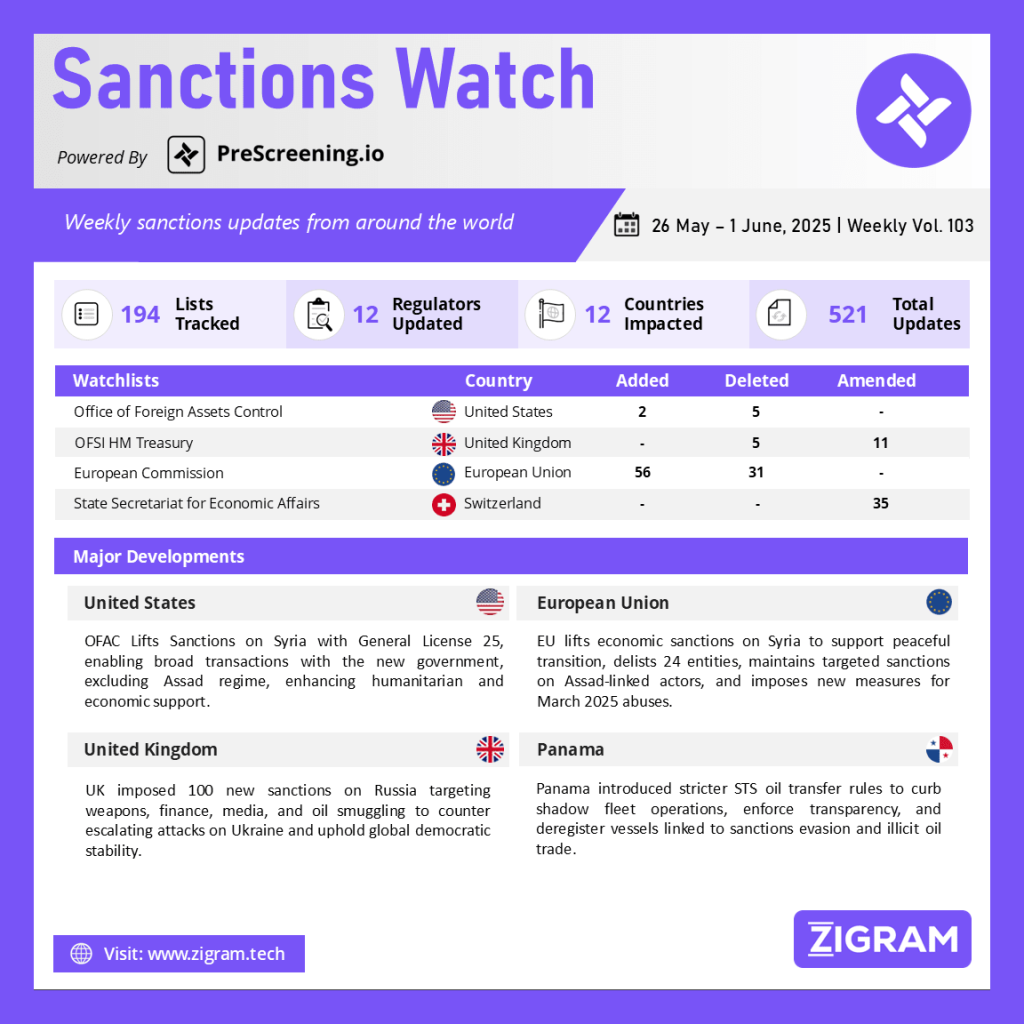Sanctions Watch Vol 103
In the latest edition of our Sanctions Watch weekly digest, we present significant updates on sanction watchlists and regulatory developments.
OFAC Lifts Sanctions on Syria Under General License 25 to Support New Government
The U.S. Department of the Treasury’s Office of Foreign Assets Control (OFAC) issued Syria General License (GL) 25, effectively lifting most U.S. sanctions on Syria. This move follows President Trump’s May 13, 2025 directive aimed at supporting Syria’s new government and promoting national stability. GL 25 authorizes a wide range of activities previously prohibited under the Syria Sanctions Regulations, including investments, services, and financial transactions with the new Syrian government and certain previously blocked individuals listed in an annex. Key sectors such as telecommunications, energy, healthcare, education, civil aviation, agriculture, and infrastructure rehabilitation are now open to U.S. engagement.
The U.S. Department of State also issued a 180-day waiver under the Caesar Syria Civilian Protection Act, reducing risks for foreign partners participating in Syrian reconstruction. However, the license excludes dealings with individuals or entities on OFAC’s Specially Designated Nationals (SDN) list—such as former President Bashar al-Assad and known narcotics traffickers—and maintains restrictions related to Russia, Iran, and North Korea.
GL 25 is self-executing, meaning eligible parties can proceed without prior OFAC approval. The U.S. government remains committed to enforcing sanctions on those associated with terrorism, human rights abuses, and drug trafficking, while encouraging Syria’s responsible reintegration into the global community.
EU Lifts Economic Sanctions on Syria, Supporting Political Transition and National Recovery
The European Union formalized a major policy shift by adopting legal acts that lifted all economic sanctions on Syria, except those tied to security concerns. This move enacts the political decision announced on 20 May 2025, aiming to support Syria’s transition towards an inclusive, peaceful, and democratic society. The EU Council’s decision includes the delisting of 24 Syrian entities—among them the Central Bank of Syria and several key players in oil, telecommunications, and cotton industries—previously subjected to asset freezes and economic restrictions.
High Representative Kaja Kallas emphasized that this step represents the EU’s commitment to aiding Syria’s recovery after 14 years of conflict. However, in line with its stance on accountability and justice, the EU extended sanctions against individuals and entities affiliated with the Assad regime until 1 June 2026. Moreover, in response to the violent incidents in Syria’s coastal region in March 2025, the EU imposed fresh restrictive measures under the EU Global Human Rights Sanctions Regime, targeting two individuals and three entities responsible for serious human rights abuses.
This strategic blend of economic easing and targeted accountability underscores the EU’s dual approach—facilitating reconstruction while reinforcing human rights and transitional justice in Syria.
UK Imposes Sweeping Sanctions on Russia to Counter Escalating Attacks on Ukraine
The United Kingdom unveiled a comprehensive set of 100 new sanctions against Russia in response to President Putin’s intensification of attacks on Ukraine, including the largest drone assault to date, which saw 273 drones launched and resulted in the deaths of 9 civilians in Sumy. The sanctions target key pillars of Russia’s military, financial, and information infrastructure, including weapons manufacturers, energy exporters, financial institutions, and media propagandists supporting Putin’s aggression.
The measures specifically sanction supply chains linked to deadly weapons systems like the Iskander missiles, responsible for multiple civilian deaths, including a recent strike on 13 April that killed 34 individuals. Fourteen more individuals from the Kremlin-funded Social Design Agency, which spreads disinformation to destabilize Ukraine and democratic institutions globally, are also sanctioned.
Additionally, 46 financial institutions—including the St Petersburg Currency Exchange and the Russian Deposit Insurance Agency—are targeted to disrupt Russia’s efforts to bypass existing restrictions. Eighteen more vessels in the “shadow fleet” smuggling sanctioned Russian oil are also sanctioned, along with their enablers, including British national John Michael Ormerod.
The UK’s action, coordinated with EU partners preparing their 17th sanctions package, aims to curtail Kremlin revenues, isolate Russia’s economy, and promote a just, lasting peace in Ukraine.
Panama Enforces Stricter Ship-to-Ship Oil Transfer Rules to Dismantle Shadow Fleet Activities
The Panama Maritime Authority (PMA) enacted Resolution No. 106-035-DGMM, introducing rigorous protocols for offshore ship-to-ship (STS) oil transfers involving Panama-flagged vessels. This move is a decisive step to counteract the global proliferation of “shadow fleet” operations—vessels engaged in sanctions evasion, illicit oil transport, and environmental non-compliance. The new rule mandates that vessels of 150 gross tonnage or more must submit detailed advance notification 48 hours before conducting STS operations. Required disclosures include vessel IDs, transfer locations, timing, and operational procedures.
This regulatory tightening comes amid increasing scrutiny. According to United Against Nuclear Iran (UANI), 17% of vessels involved in suspected Iranian oil smuggling carry the Panamanian flag. In response, Panama deregistered 107 such vessels in March 2025. Still, enforcement remains under fire as recent U.S. sanctions implicated two Panama-flagged ships delivering oil to Yemen’s Houthi rebels. The PMA’s alignment with IMO and MARPOL standards underscores a broader push for transparency and maritime safety. Additionally, Executive Decree No. 512, passed in October 2024, authorizes deregistration of vessels whose owners are sanctioned. While the steps signal a crackdown, experts urge Panama to undertake deeper reforms to police one of the world’s largest ship registries effectively.
Know more about the product: PreScreening.io
Click here to book a free demo.
Sanctions Watch is a weekly recap of events and news related to sanctions around the world.
- #SyriaSanctionsLifted
- #MiddleEastStability
- #USForeignPolicy
- #EUSyriaPolicy
- #SyriaPoliticalTransition
- #GeopoliticalShifts
- #AssadSanctions
- #CeasarActWaiver
- #InternationalSanctions
- #SyriaReconstruction
- #InvestmentInSyria
- #TelecomRecovery
- #EnergyRehabilitation
- #HealthcareDevelopment
- #EducationForPeace
- #InfrastructureRevival
- #PostConflictRecovery
- #EconomicTransition
- #OFACTreasury
- #EUSanctionsPolicy
- #UKRussiaSanctions
- #RussianAggression
- #SanctionedEntities
- #ShadowFleet
- #OilSmuggling
- #PanamaMaritimeReform
- #ShipToShipTransfers
- #SanctionsEvasion
- #IMOCompliance
- #MaritimeTransparency

